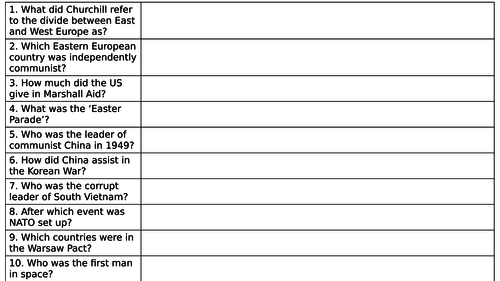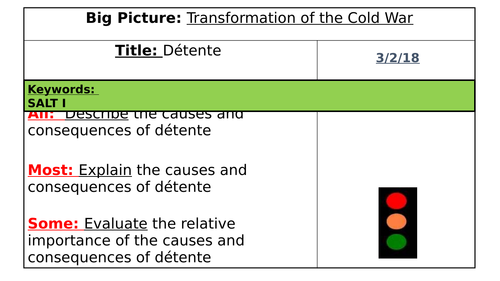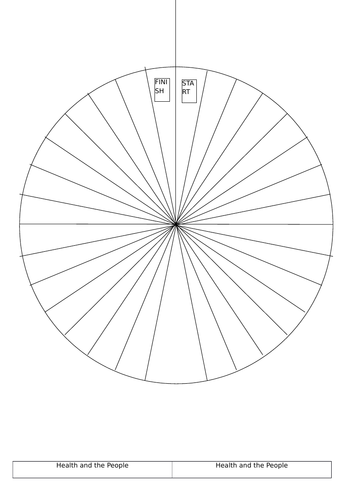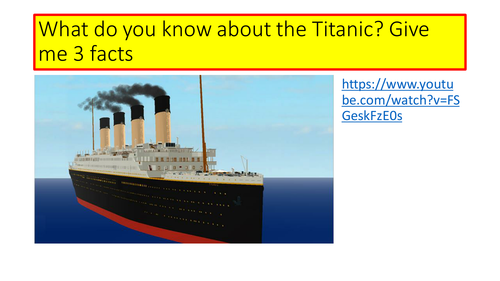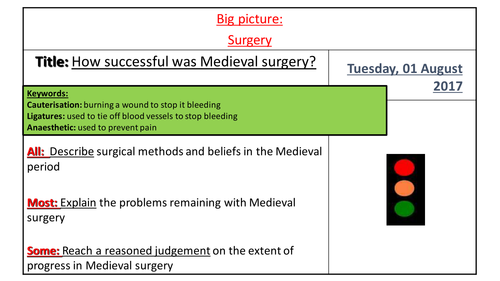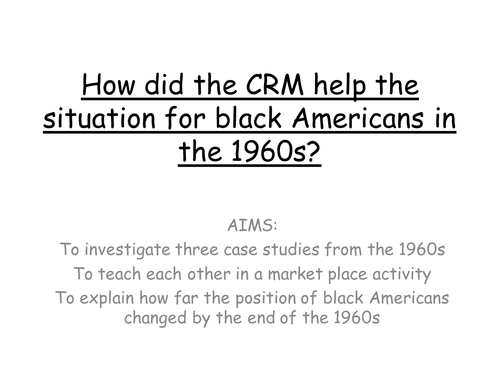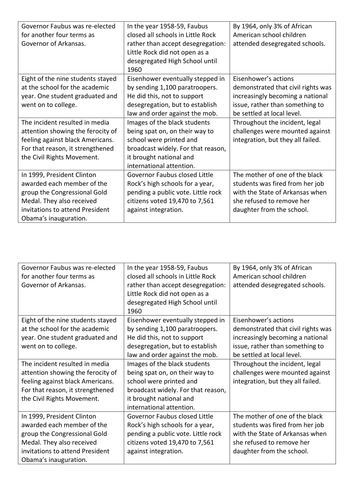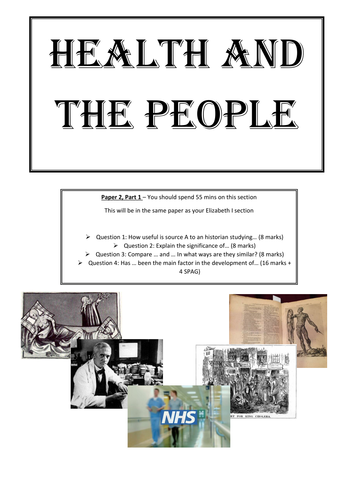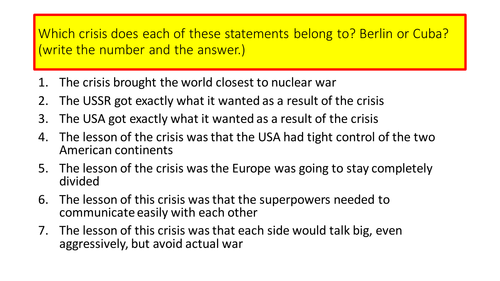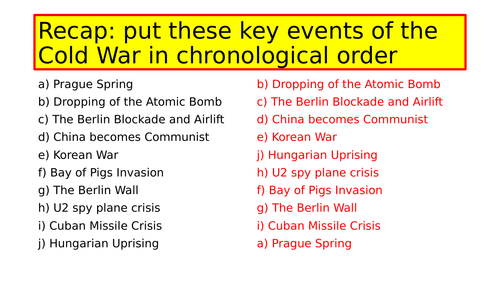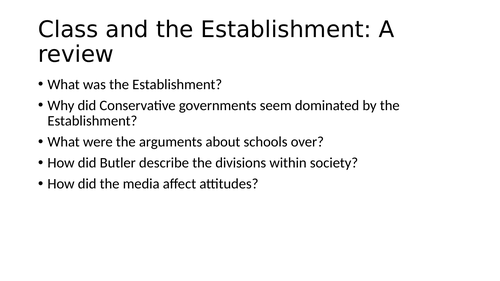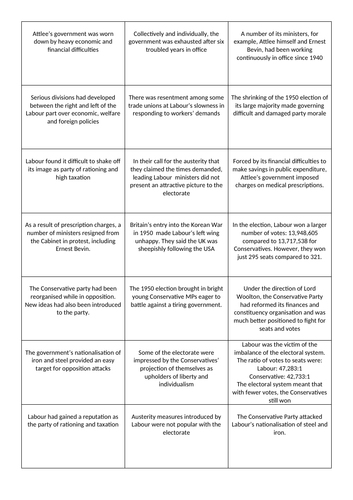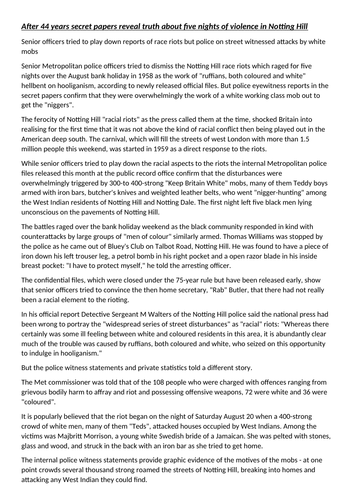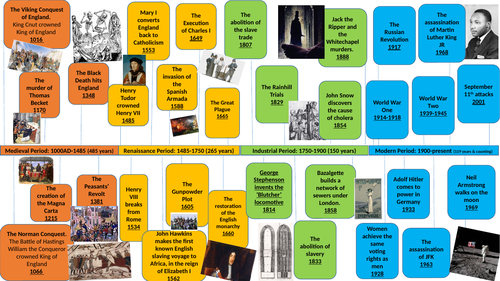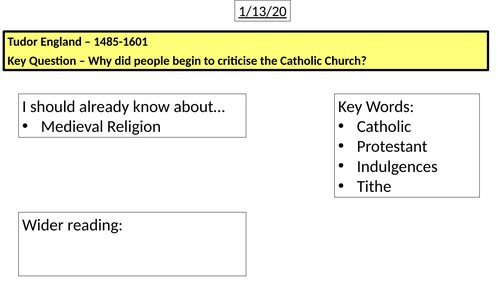
170Uploads
40k+Views
18k+Downloads
All resources

AQA 8145 - Conflict and Tension: Cold War - The Arms Race
A GCSE lesson in which students will understand the importance of the arms race within the context of the Cold War. Includes a range of tasks in which students will gain the required understanding, and a number of tasks to develop specific source skills for their GCSE course.

AQA 8145 - Conflict and Tension Cold War - Detente
A GCSE lesson for the AQA specification in which students examine the barriers to detente, the reasons for detente and the consequences of the improving relationships. Links to a 16 mark exam essay question, as students will consider a variety of factors and reach a judgement on the most significant.

AQA 8145 Medicine: Health and the People - Revision games
3 revision games which can be used in class for the whole lesson, or for a few minutes. Includes articulate cards and a board which are organised in to themes of causes, cures and treatments; public health; surgery and key people. Also includes a game of memory match and a board game (dice needed) with key questions.
Bundle

AQA 8145 - Conflict and Tension Cold War: Transformation of the Cold War
A series of lessons covering the last part of the AQA GCSE specification from the impact of the Berlin Wall to Detente. Includes a range of exam style questions and guidance for students alongside content.

The Titanic - Why did so many people die: an investigation
A KS3 lesson in which students will investigate why so many people died on the Titanic. Students will consider the role of various factors, including attitudes to class and reach a judgement on the most significant reason. Students will be required to categorise, interrogate and collect evidence.

AQA 8145 Medicine - Medieval Surgery
A GCSE lesson in which students will consider the progress and limitations of Medieval surgery. Students will consider how successful Medieval surgery would have been by comparing to necessary factors in modern day surgery in order to analyse the limitations.

Civil Rights Movement - protest in the 1960s
A 2 lesson series in which students consider the effectiveness of methods of protest in the 1960s: freedom rides, freedom marches and the black power movement. Includes a variety of activities which students can complete in a carousel across 2 lessons.

Civil Rights Movement - Consequences of Little Rock
A follow up lesson in which students examine the consequences of Little Rock and therefore its significance for the Civil Rights Movement. This lesson will also act as a summary in which students consider the progress made by the CRM by the end of the 1950s.
Bundle

Civil Rights Movement - Protest in 1950s
A series of lessons in which students examine the significance of 3 key events during the 1950s. Students will use these to assess the extent to which life had improved by the end of the decade.

AQA 8145 Medicine - Health and the People Revision Guide
A revision guide tailored to the AQA Health and the People specification for GCSE. The guide is split in to three main themes in line with the 16 mark question: Understanding Causes and Cures; Public Health and Surgery. Includes practice questions and quizzes to aid revision. The information is broken down to make it easier for students to use in their own revision, and pictures and acronyms will help students to recall the information ready for their GCSE exam. Students will also find a guide to the key factors throughout the guide to help students prepare for the 16 mark question.

AQA 8145 Conflict and Tension - Cold War 1945-1972: Causes and Events of the Prague Spring
A GCSE lesson in which students will explain the causes of the Prague Spring and consider the reactions to Dubcek's reforms from a number of groups. Students will be encouraged to compare the crisis in Czechoslovakia to the Hungarian Uprising. Includes an exam style question and tips to help students answer.

AQA 8145 - Conflict and Tension Cold War: Consequences of the Prague Spring
A GCSE lesson in which students consider the impact of the Prague Spring. Students will consider a 16 mark exam question on the main consequences of the Prague Spring by gathering relevant information to support key consequences before reaching a judgement on the most important consequence.

Making of Modern Britain - youth culture 1950s
An A-level lesson in which students examine the reasons for the development of youth culture in the 1950s. Students will use their understanding to examine three conclusions to focus on exam technique, and consider the strengths and weaknesses with the conclusions. Furthermore, students will link their understanding of youth culture to other social changes to analyse the moral panic and reactions to the development of youth culture.

AQA 7142 Making of Modern Britain - Women 1950s
An A-level lesson in which students examine the extent to which the lives of women were changed during the 1950s. Students will analyse the extent to which lives have changed for women economically and socially.

Making of Modern Britain - Conservative fall 1964
An A-level lesson in which students examine the causes of the Conservative fall from power in 1964. Students will work in groups to evaluate the relative significance of a range of factors before reaching their overall judgement.

Making of Modern Britain - 1951 Labour defeat
An A-level lesson in which students understand the reasons for Labour’s defeat in the 1951 election, providing valuable contextual knowledge for the beginning of the course in 1951. Students will be required to categorise their reasons and begin supporting their arguments.

AQA 7042 Making of Modern Britain - Race Riots
An A-level lesson looking at the underlying causes, events and consequences of the Notting Hill Race Riots, in which students carry out an investigation and report back on their findings. Uses a range of sources and historical extracts to support their learning.

What was Tudor England like?
A KS3 introductory lesson to the topic of the Tudors. Students will gain an introduction to key themes and a sense of period as they understand life in Tudor England.

Why did people criticise the Catholic Church?
A KS3 lesson which introduces the split between Catholics and Protestants before students study the Reformation in England. Students will consider why people began to criticise the Catholic Church before writing their own version of Luther’s 95 theses to demonstrate their understanding.

Russia 1894-1941: Opposition to Nicholas II
An A-level lesson in which students evaluate the threat posed by the four main opposition groups to Nicholas II at the start of his rule. Students will use criteria such as popularity, how revolutionary, how united to reach an overall judgement on the significance of the threat each group posed, and will record their findings in top trumps cards to allow direct comparisons. Students can work in groups and teach each other, or independently. Students will finish by reaching a judgement on the group that posed the greatest threat, similar to the skills required in the short essay question.

